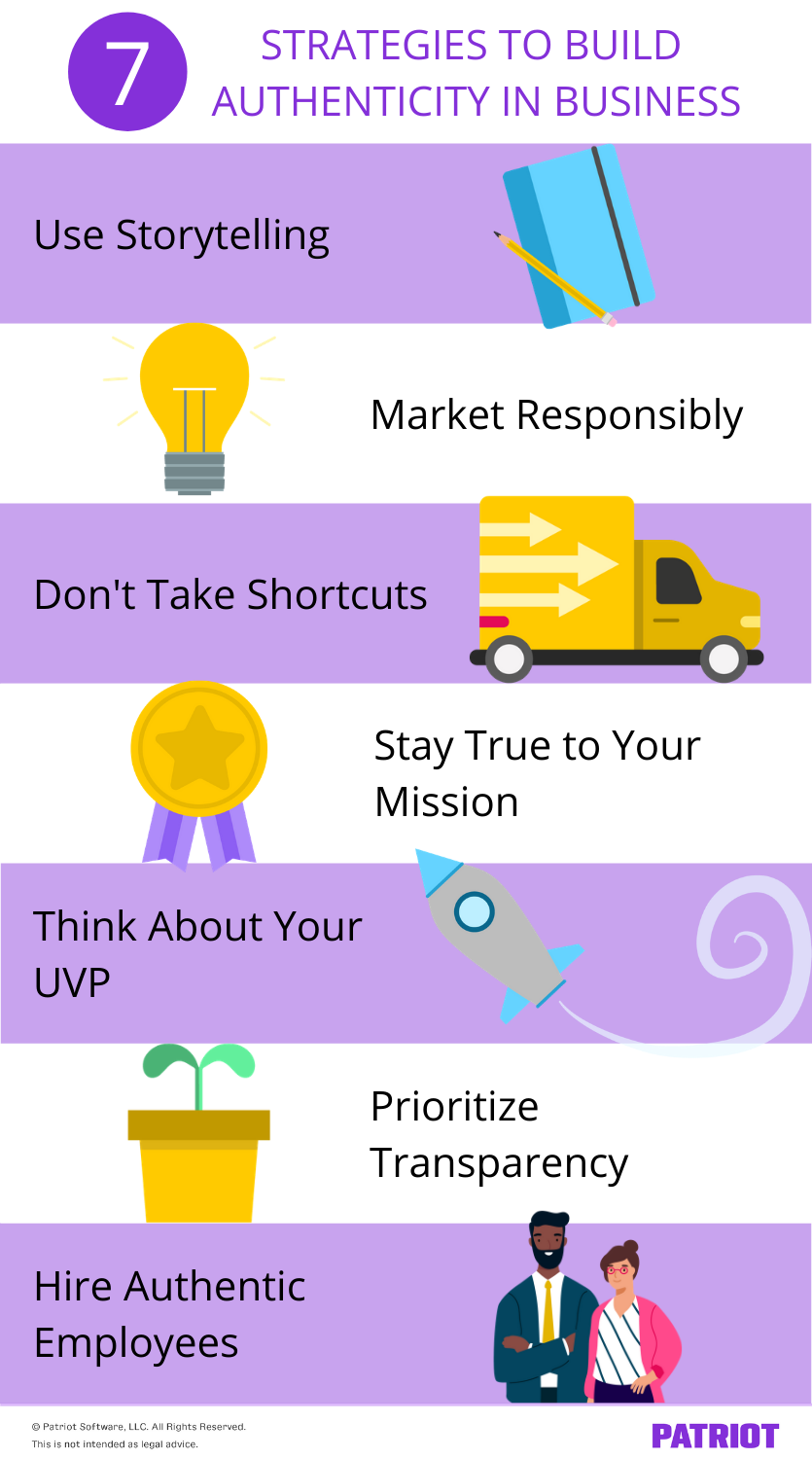On a scale of 1 – 10, how authentic is your business? Are you honest, transparent, and real? Does it matter? Absolutely, it does. Authenticity in business can make all the difference between leading the charge and playing catch-up.
So … how do you get it?
7 Strategies to build authenticity in business
Someone or something that’s authentic is genuine. Authenticity isn’t fake or counterfeit.
In short: Authentic people and things are the real deal. And when it comes to business, this matters more than you may think.
Take a look at the following seven strategies to build (and maintain) authenticity in business.

1. Use storytelling
Authentic people and things have stories behind them. These stories back up claims and highlight how they got to where they are today.
An authentic meal? Passed down from generation to generation. An authentic artifact? Found through an excavation in some part of the world.
An authentic business? Started in the basement of a factory, built up through years of struggle, determination, and grit (i.e., Patriot Software’s startup story).
You need to be a storyteller. And not just any storyteller—you need to specialize in nonfiction. If you want authenticity in business, don’t lather your customers up with a fake or embellished story. Be real.
Morgan Taylor, CMO for LetMeBank, offers the following on the importance of using storytelling for authenticity:
Share your story, how you started, what makes you who you are, and how difficult it was at the start. People love it when the underdog wins, so don’t be afraid to speak about your company’s humble beginnings.”
Your startup may not be the best story in the world. Maybe you really didn’t have to go through much to start your business. But chances are, there’s something authentic and relatable in there that people want to hear.
2. Market responsibly
One of the number one complaints consumers leave on review sites is that they were promised X from a business but received Y.
You need to keep it real when marketing.
If you say that you serve only authentic Italian food in your marketing materials, your food must be authentic … and Italian.
Your marketing needs to reflect your business’s actual operations. If it doesn’t, your marketing becomes inauthentic, as well as our business.
Ensure your marketing team is working together with other departments. Verify small business marketing ideas are properly vetted before sending out materials with inauthentic promises, deals, or products.
Greg Birch, Content Marketing Manager for Drop Ship Lifestyle, advises:
Most customers are used to being promised the moon, so you can stand out by giving real specific statistics/reviews from your past/current customers about how your business worked for them.”
3. Don’t take shortcuts
What happens when you take shortcuts in business? Things are rushed, corners are cut, and quality substitutions run rampant. This is where inauthenticity can creep in.
Rather than taking shortcuts in business, put in the time to maintain your authenticity. Uphold that original “wow factor” about your business that makes you, you. Which brings us to the next point…
4. Have a mission, and stay true to it
Maybe you started your business because you were passionate about something. Or, maybe you started it because you were passionate about being an entrepreneur. Whatever the case may be, you likely started with passion and a mission.
Do you still have that mission? Or, have you lost it along the way?
Authentic businesses don’t lose touch with their mission (or passion). They continue pursuing their core mission—which of course may grow and adapt.
Many entrepreneurs carry what matters most to them into their business, which helps build its authenticity. For example, there are a number of for-profit businesses with a B Corp certification. This certifies that the business is committed to building a better society and environment while remaining accountable.
Staying true to your mission shows that you’re sincere about what your business stands for and is working for.
5. Think about what makes you unique
Nobody wants a copycat. If you’re trying to copy a competitor, your customers could go to them instead. You need to be the real McCoy. To do that, think about what makes your business unique.
What’s your unique value proposition? What can you offer your customers that others can’t? Whether it’s top-tier customer service, a hard-to-come-by offering, or low prices, hone in on it and show customers your business’s authentic self.
6. Prioritize transparency
Sometimes, it’s tempting to want to avoid issues altogether by not talking about them. But, failing to give people (e.g., customers or employees) the whole story can sometimes be a form of feeding them fake information.
Don’t mislead.
Instead, be transparent with all the people you work with in business. Transparent businesses are open and honest with the public—they don’t have anything to hide. And when you don’t have anything to hide, you can be your true authentic self.
To give authenticity in the workplace a fighting chance, be transparent with your employees, customers, investors, and so on. Be forthcoming when it comes to sharing information, advertising your prices, and acknowledging slip-ups.
7. Hire people who are authentic
It doesn’t matter how authentic you and your business are if the people you hire aren’t.
When bringing on new hires, make sure they are who they say they are. It’s easy for candidates to put on a face during the interview process and act completely different once on the job.
To help you avoid hiring duds, learn how to hire the best employees. Ask behavioral questions during the interview, do some pre-employment screening, and get to know applicants in general. That way, you can rest assured that you’re hiring the real deal when you extend a job offer to your top candidate.
So, why does it matter?
Being authentic in the workplace is just as important for your employees as it is for you. Whether it’s interoffice or customer communication, inauthenticity can deplete your company’s culture or reputation.
